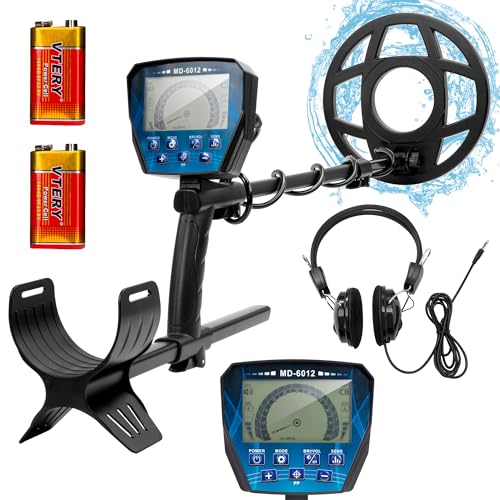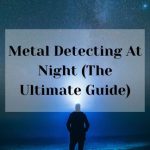
As you begin your search for the best metal detector for treasure hunting, you will soon begin to realize that picking the right equipment can be difficult. Some machines on the market represent a sizable investment, so you want to get it right.
Some people have even said that finding the right detector is probably more difficult than finding the treasure you intend to search for with it. The reason for this in-depth guide is to help you navigate through the various models out there, so you can be sure to make the correct informed choice when you buy.
So what do you need to look for when searching for the best metal detectors for treasure hunting machine? We will cover this in more detail in the article, but things like your budget, your level of skill or knowledge about metal detecting, and where you plan to do your treasure hunting all come into play.

Rest assured that it is possible to find the perfect high-quality machine which is right for you. And after reading the article you will be in a much better position to make that choice. So let the treasure hunting begin as you read up about some of the best metal detectors for treasure hunters on the market today.
If you are in a hurry you can check out our quick review section below of the 10 best metal detectors, then dig down deeper for more helpful buying info and complete reviews of those models.
The 10 Best Metal Detectors For Treasure Hunting
1. Editor’s Choice: Garrett AT Pro Metal Detector
2. Best for Low Price: Garrett ACE 400 Metal Detector
3. Best Underwater/Waterproof: Minelab Excalibur II
4. Best All-Terrain Detector: Minelab CTX 3030
5. Best Budget Waterproof Detector: Nokta Makro Simplex
6. Best For Finding Gold: Minelab 3720-0002 Equinox 800
7. Best For The Novice: Fisher F22
8. Best Budget Detector: BountyHunter TK4
9. Best Underwater All-Purpose Machine: Fisher 1280X-8
Metal Detector Comparison Table

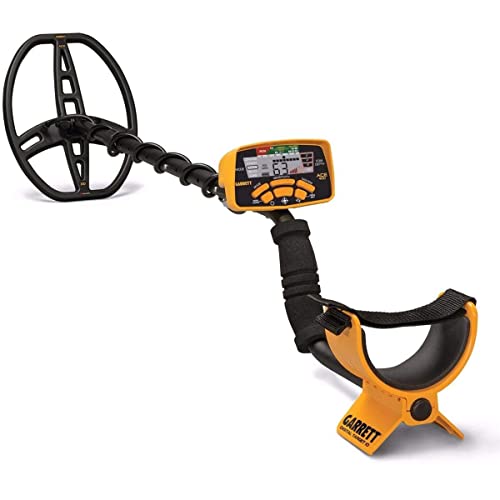

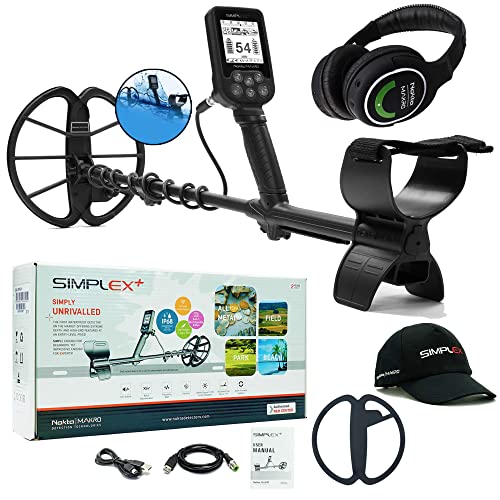








How Do Metal Detectors Work?
Now you don’t have to understand how a metal detector works to find treasure, but a little knowledge won’t hurt, right? Detectors operate by sending an electromagnetic field from its coil directly into the ground. Now if there are any metal objects within that electromagnetic field, the object or target, will become energized and retransmit an electromagnetic field right back at you.
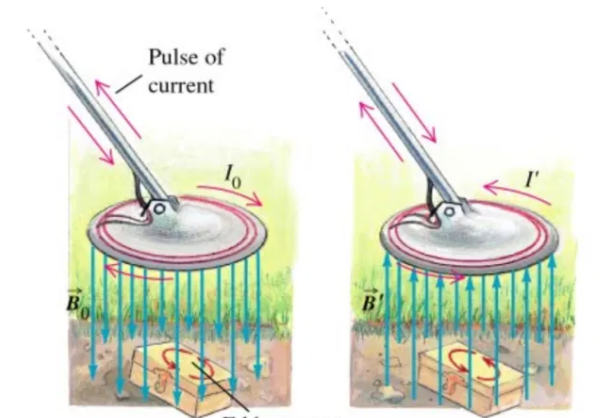
The detector’s search coil then receives this retransmitted signal and alerts the user to its existence. The great thing for us is that metal detectors are capable of telling the difference between different metals and can be set to ignore unwanted targets that you have no interest in digging up.
What Type of Detector Do I Need?
This is a difficult question to answer and will depend mainly on what type of buried treasure you want to find. But to get some understanding of the different types of detectors we can divide them into three categories which are designed for various specific jobs. These are:
- Coin and relic hunting mainly on land.
- Beach detecting and also underwater searching
- Prospecting for gold and precious metals.
A good all-round metal detector is probably the best choice for the novice treasure hunter. With it, you will be able to find coins and many other metallic objects. Sometimes it can turn up some precious metal, such as gold or silver too. So if you are not too sure what type of metal detector to get, this will probably be the best choice.
Metals detectors that are made to detect on beaches and under or around water need certain design elements to allow them to operate efficiently. These machines tend to be more robust in their construction and all of their elements and parts must be resistant not only to water but rust too.

If they are made to find underwater treasures such as wreaks, then the whole unit needs to be waterproof. The adjustments available need to be different to land-based detectors as well, to cope with things like saltwater and the problems this can cause to electromagnetic devices.
Gold detectors are quite specialized machines. They tend to use a higher frequency to be able to detect the difference between gold and other metals. These metal detectors are generally found in the gold-rich areas in the US and are invaluable in creaks and other places where gold nuggets can be found.
What To Look For When Choosing a High-Quality Metal Detector
Type of Detector
Generally speaking, there are 3 different types of metal detectors available. These are:
- BFO or Beat Frequency Oscillation
- VLF or Very Low Frequency, and
- PI or Pulse Induction Detectors.
It’s important to understand a little about each one before you make your buying decision.
Beat Frequency Oscillation: This is the most commonly found type of detector and is considered the weaker relative to other metal detectors which are available. It is generally the lowest-priced model in the store and its simplicity makes it a much cheaper option, especially for the complete beginner. These machines are capable of finding metallic objects up to around 2 feet below the surface.
Very Low-Frequency Detectors: VLF detectors are the most popular among many experienced detectorists. These machines offer much greater sensitivity than the BFO type and are more accurate too. This type of detector can distinguish between different metals by generating different frequencies.
This is a great time saver as you only dig the targets that you want to. This is a great choice of detector if you want a more precise level of detection rather than just a random search.
Pulse Induction Detectors: PI detectors are found in many security situations for finding concealed weapons and also in the high-quality metal detectors you can buy, although they tend to be expensive. They are also the most powerful detectors you can get.
That being said they are not great at discrimination due to the way they operate. Although they are very effective in situations where there are highly conductive materials in the soil. These are ideal for saltwater searching and even on land detecting, they can detect a lot deeper than other machines.
Detector Weight & Dimensions
Most detectors you can buy are lightweight, compact, and easy to handle. It is very rare to find a machine that weighs more than 3 or 4 pounds unless it is a specialist metal detector.

Bear in mind you could be swinging this detector for many hours, so your ability to carry the machine based on your size and physicality should be taken into consideration before you buy
Sensitivity and Frequency in Metal Detectors
The sensitivity setting on a metal detector allows the machine to detect targets at various depths. While most detectors you buy can adjust the sensitivity some do not. It would be best to avoid those, especially the lower-priced ones and you should be looking for a detector that has at least 3 sensitivity levels.
The frequency in a metal detector refers to the number of times the machine sends or transmits a signal into the ground. Which is best? Again it all comes down to what you want to find.
The higher range of frequencies is better for finding treasures such as coins and small nuggets. But the lower frequency settings on a metal detector can penetrate to much deeper depths.
Search Depth
If you want to find objects at greater depths then you can buy a VLF detector. The ideal situation would be great search depth and the ability to zone in on small targets. Unfortunately, you may find yourself choosing between the two.
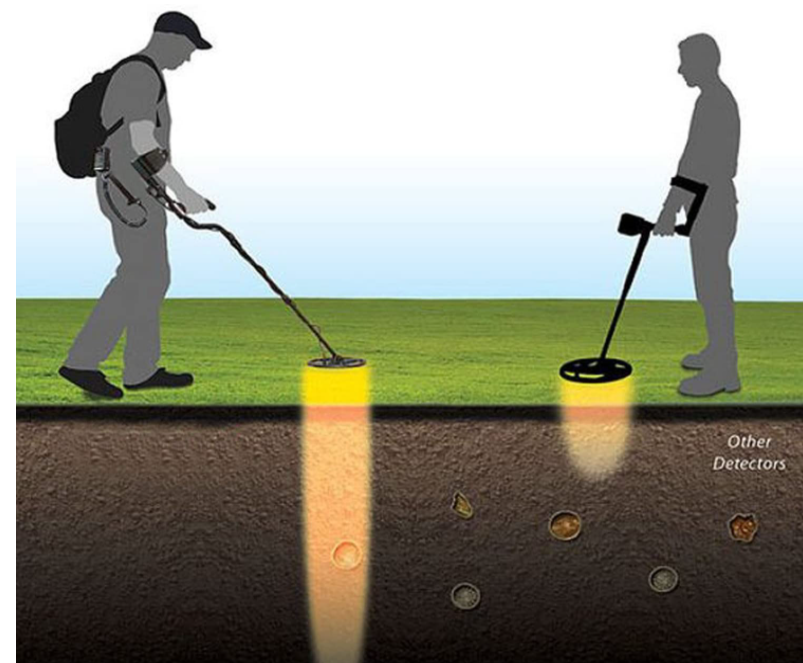
Again this choice comes down to the question ‘What treasure are you trying to find?’ If you want to find large objects that are very deep, then a low-frequency detector fitted with a large coil should be your benchmark.
Different Coil Size and Types
The choice of search coil that manufacturers fit onto their machines can optimize the detector in many ways. These areas that the coil can affect are the depth, mineralization level of the soil, the size of the area that is detected, and isolation of the number of targets in a particular area. The most common method of modifying the coil is to change its shape and alter its size. shape and size.

The size of the coil will determine how deep and how wide the resulting electromagnetic field will be. The greater the size, the greater the depth and width due to the large magnetic field. So bigger is better right? Not always.
A larger coil will also find a lot of trash whereas a smaller one will zone in with more precision and will also be able to get into areas between trees, bushes, or rocks.
Functionality Features
Another area that you need to be aware of is that wherever you detect the soil will have trace minerals in it. For the average metal detector, this is not great as these minerals can interfere with the performance of your machine.
This is where you need a machine with automatic ground balance. . A machine with automatic ground balance can help the detector ignore these minerals allowing you to focus on the good stuff.
Discrimination is a way of setting the detector so that it ignores certain metals but allows it to focus on others. When set correctly the detector won’t send you the signals from trash, such as bottle tops and nails. Allowing you to search more, but dig less.
Price and Warranty
Getting a good metal detector to take out treasure hunting can cost a lot of money, but the potential to find that priceless buried treasure can give you a great return on your investment. This is why you should have a clear picture of what your budget is. And don’t forget that there will be other things you will need too.

One piece of advice would be to stick to the established brands, such as Garrett, Minelab, Fisher, Bounty Hunter, and Nokta Makro. A quick Google search will tell you who are the best (and who are not) because not only will you be getting a well-made metal detector, manufactured with quality electronics, but you will also get the benefit of their warranty…just in case.
10 Best Metal Detectors Reviewed
1. The Metal Detecting Guy’s Choice: Garrett AT Pro Metal Detector
Garrett has a great reputation within the world of metal detecting. And the Garrett AT Pro is one of the best detectors they have ever made. When you compare this machine with others in the same price range, this machine stands head and shoulders above the rest. It has all of the features that you will ever need from a detector. It is suitable as an all-terrain detector and has the added bonus of being submersible up to 10 feet. It has a lightning-fast recovery speed, so can distinguish between objects which are in close proximity to each other.
This is a great metal detector and includes some really impressive features. Many times when you buy a new metal detector you may find that when searching different environments the machine can have its drawbacks. Not so with the Garrett AT PRO. This amazing machine can handle almost any type of terrain or conditions you can throw at it.

The Garrett AT PRO has all the usual features that you will find on a quality detector. Preset search modes and a very handy Iron Audio setting, which enables the user to accurately determine whether it’s trash or something more valuable.
This lets you hear a signal for Iron that is typically missing or too faint to hear, on other detectors. Less time digging, more time searching.
Proportional Audio response and Tone Roll Audio features allow a user to hear subtle changes in target’s response to better judge conductivity, size, shape, and depth
Another great feature of the AT PRO is that it boasts a high search frequency setting of 15kHz that lets it find difficult to find targets with a high level of precision, even identifying gold nuggets when the circumstances are right.
What takes this amazing machine to another level is its two audio settings (Standard and Pro) The basic being the tones a user hears with any standard detector, but switch to the Pro Audio Response and the detector will alert the user to signals which are missing on most detectors even in the same range as this machine.
Another great feature of the AT Pro is the ability to adjust the ground balance manually. This allows the user to fine-tune the setting when searching soils with a high mineral content such as saltwater beaches.
Pros & Cons
Conclusion
2. Best for Low Price: Garrett ACE 400 Metal Detector
Whatever metal detector you buy to look for buried treasure, one thing is guaranteed, while you are learning how to use your shiny new machine, you will be digging up a lot of trash. Fortunately, the Garrett ACE 400 has loads of great features that can take away a lot of the guesswork and have you finding treasure in no time.
It has five modes of detection to help you to target specific targets, such as coins, relics, jewelry, all-metal, and a custom setting.
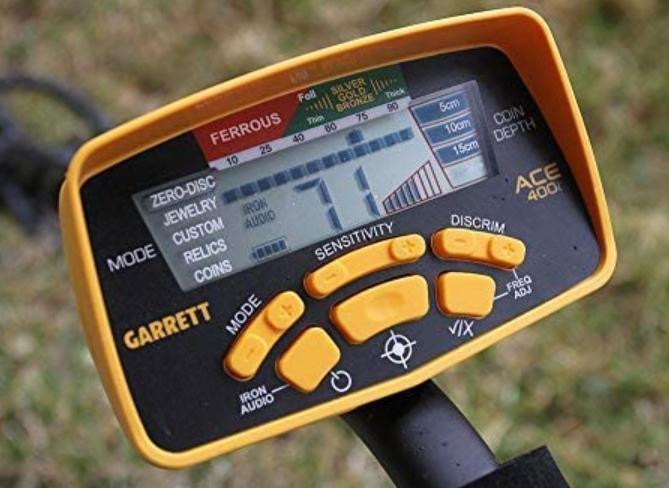
Another great feature is the Iron Audio function. This setting is handy and can help in deciding on what to dig up and what to pass over. And to help out on those long detecting sessions, the ACE 400 only weighs 2.9 pounds so fatigue should not be a problem.
This detector from Garrett is a great improvement from all of its predecessors. It has remarkable sensitivity, but one of the major advantages is the great price – and with all the advanced features, it is somewhat of a bargain.
One drawback of this otherwise impressive machine is the lack of manual ground balancing. The ability to do this can help you to fine-tune your detector in highly mineralized soil conditions and even saltwater areas.
Having said that, it is still a good choice for most beginners, who want an easy-to-use detector, without having to master lots of technical settings.
Pros & Cons
Conclusion
3. Best Underwater/Waterproof: Minelab Excalibur II
If you want to search for treasure beneath the waves, then this detector, from the well-respected Minelab company, is the one to go for. Although the learning curve is steep, once you get the hang of it it could pay for itself in no time. From its fluorescent body, which makes it easier to see under the water, to its advanced underwater features, this is a serious piece of equipment.
This detector was specially designed to address the issues that prospecting under the water can bring. It has 17 operational frequency settings and these range from 1.5 kHz right up to an amazing 25.5 kHz.
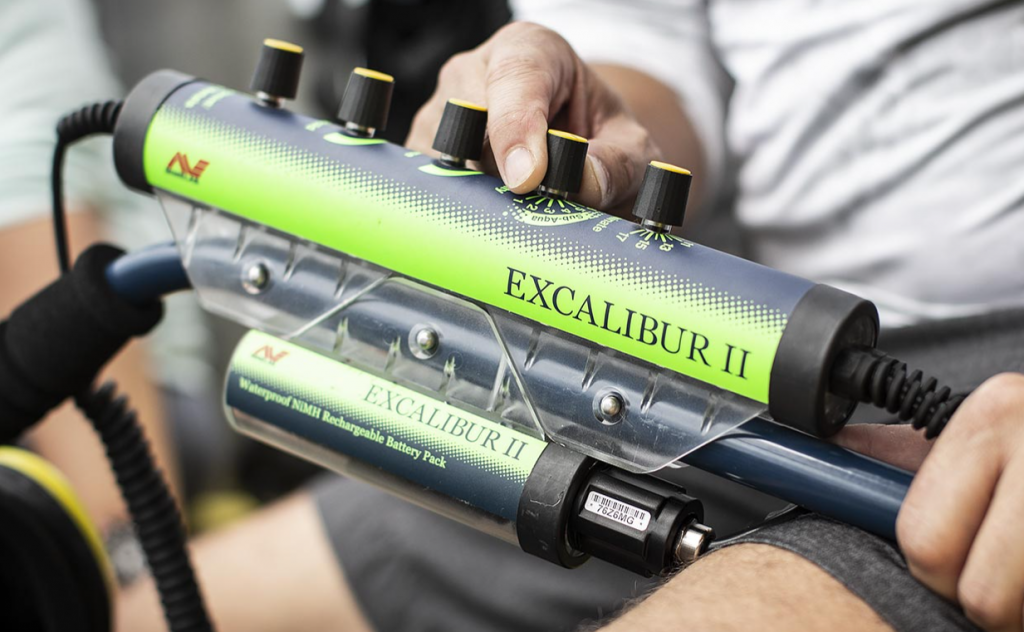
This machine is fully waterproof and can be used to a depth of around 190 feet. With its discrimination feature, it allows you to weed out the trash even at those amazing depths.
A technology called Smart Ground Balance also enables you to avoid any distortion due to the mineralization and false signals that the saltwater can bring. It can also be used in freshwater as well, with equally amazing results.
The Excalibur II is an extremely popular underwater detector and you’ll find people raving about it on forums. It is a VLF metal detector and ignores iron and minerals – you also don’t need to ground balance it.
The Minelab Excalibur II is jam-packed with some cool features which help you get the best results when searching in water. And it is these specialized features that show that this machine was engineered with the complicated issues that can arise as you venture underwater.
Having said that, this detector is just as much at home when treasure hunting on land, around the beach, or in shallow water, with very little adjustment needed.#
Pros & Cons
Conclusion
4. Best All-Terrain Detector: Minelab CTX 3030
The CTX 3030 is Minelabs best performing, all-round, all-terrain, metal detector. It will discover targets in many different environments and every type of soil. It features five extremely efficient preset search modes but is also customizable for the more experienced detectorist.
Although weighing in at a hefty 5.2 Ibs, it is designed in such a way as to feel balanced, mainly because most of that weight comes from behind the armrest where the battery pack is located. If you are a complete novice when it comes to metal detecting, you may find the CTX 3030 a little complicated at first, and be aware that it does have a steep learning curve if you want to get the best from this incredible machine.
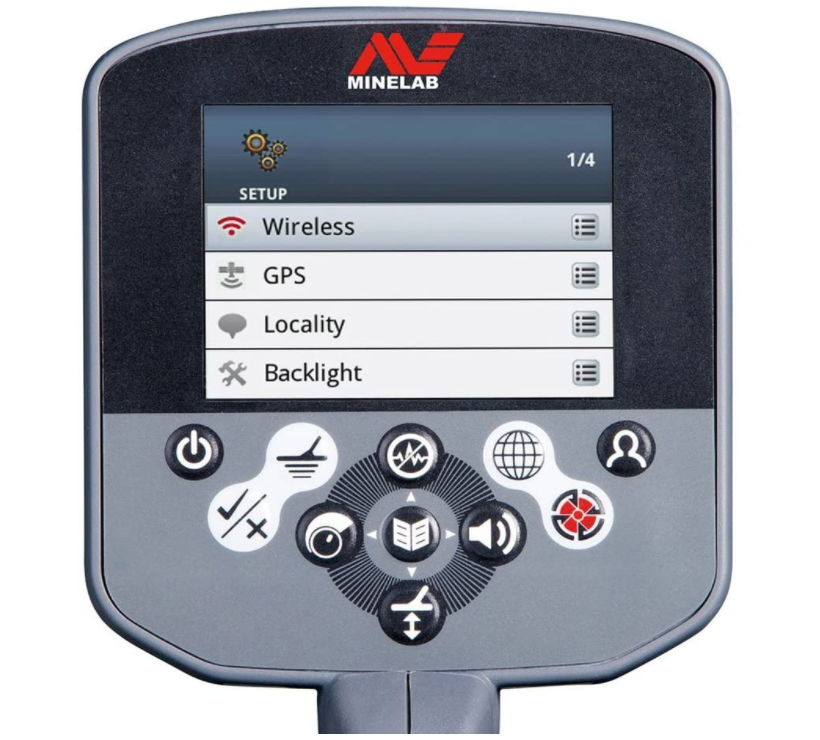
The large LCD display allows you to see all the relevant data needed and is bright enough to be visible even in bright sunshine and as it is waterproof up to 10ft you will have no problems searching in or around water too.
Great technical specifications, the variety of settings available, and the flexibility of downloadable customization give the user countless possibilities for all types of treasure hunting.
One of the most impressive things about the MTX 3030 is the advanced control box. It makes it simple to adjust settings and to choose different options but also features a GSP system called Geostore. This enables the user to store up to 100 locations, and then the navigation tool lets you revisit these areas. This is ideal when searching large areas and makes your sessions more effective and efficient.
Pros & Cons
Conclusion
5. Best Budget Waterproof Detector: Nokta Makro Simplex+
What makes the Simplex+ the best budget waterproof detector? Probably everything about it! Its high-quality build, it’s completely waterproof, the amazon DD coil, its quick recovery speed, its search depth, I could go on. Now while a lot of metal detectors on the market today have all these features, I don’t know of another one that does at this price point.
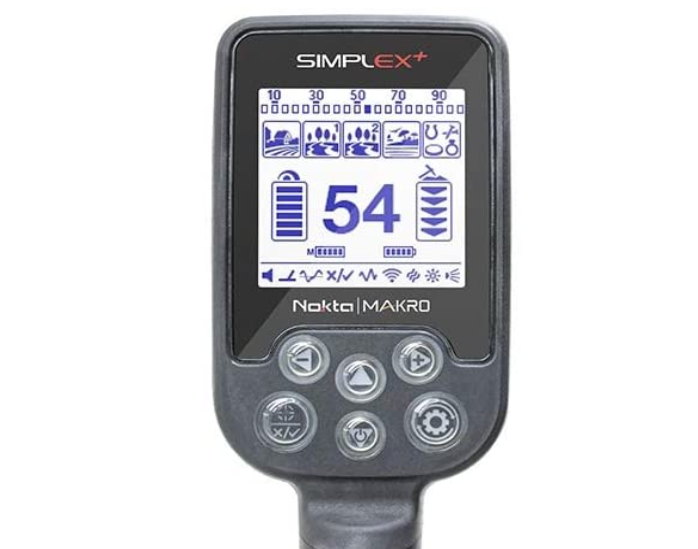
This is probably the first time a machine at this price point contains so many advanced features. What the engineering team at Nokta Makro has done is packed in some seriously expensive tech, into a very affordable device. It is extremely easy to set up and use but can also appeal to the more advanced detectorist as well, due to the amount of incredible technology in this unit.
If you are after a do-it-all and take-it-everywhere kind of metal detector at a great price, you don’t need to look any further
This detector also has something I haven’t seen before on a machine of this price, a vibration feature. This is extremely useful in many circumstances one being if you, like me, are a little hard of hearing or you are using it underwater.
A great deal of thought has gone into the design of the Simplex+, weighing in at just 2.8Ibs it is also compact and collapsible, which is great for transportation. The machine is also waterproof to a deep of 10 feet! As you can see there is not a lot to dislike about this detector.
Pros & Cons
Conclusion
6. Best For Finding Gold: Minelab 3720-0002 Equinox 800
Reliability and the name Minelab go hand in hand. And the Equinox 800 lives up to that billing. Really versatile and extremely efficient this detector can perform in any terrain and any type of conditions due to having the latest state-of-the-art technology built in. Because of this, it has become one of Minelabs best selling detectors.
The Minelab Equinox 800 is a great all-around metal detector that comes with all the features and functions you need when searching for metals of all descriptions. One of the most impressive is the Multi-IQ feature that allows you to search an area using a multi-frequency mode.
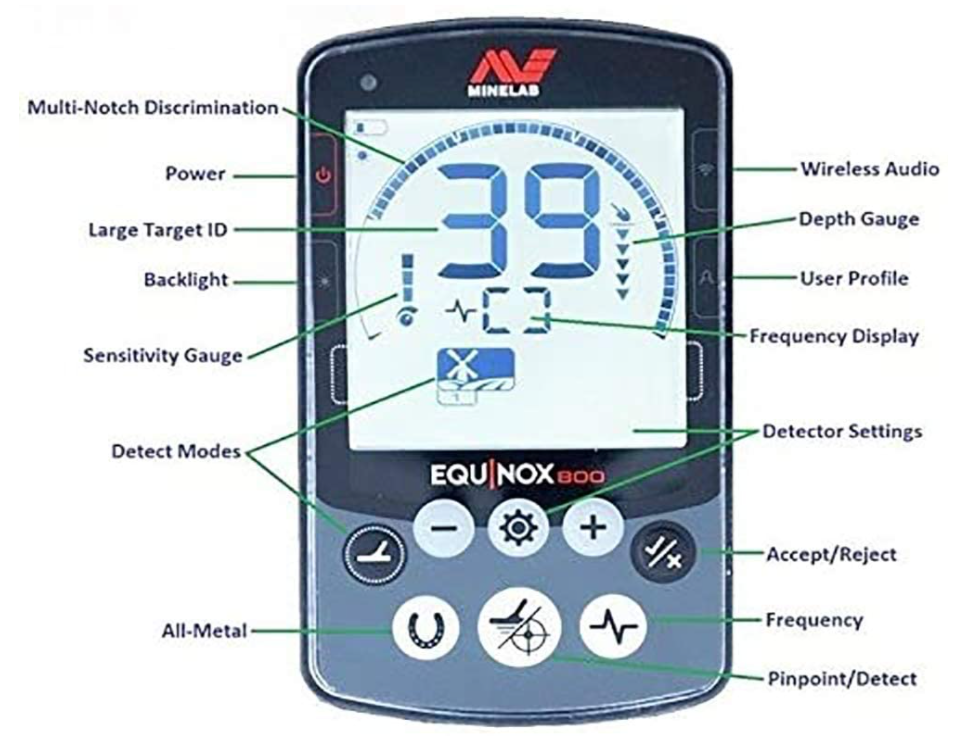
Other excellent features include waterproof to 10 feet, a high-quality discrimination setting, that ignores trash and ferrous metals, as well as the four built-in search modes, one of them being gold.
With such a wide range of frequencies available, this machine allows you to search for anything, whether it is coins, antiquities, or even gold nuggets, there is a preset mode to suit. While the Multi-IQ feature drastically increases the depth and stability of the target location.
This machine can easily find gold nuggets especially buried in highly mineralized soil conditions. In this mode the machine operates at a high frequency of 20 or 40 kHz, making the chance of detecting gold nuggets high should they be there, even in severe ground conditions.
Pros & Cons
Conclusion
7. Best For The Novice: Fisher F22
This is an entry-level ‘straight out of the box’ type of metal detector. So if you are new to detecting and you want a powerful and affordable machine that is also a great all-rounder, look no further than the Fisher F22.
Having said that while this is aimed primarily at the novice, it also has some very impressive features built in. Lightweight at just 2.3 Ibs and with a cushioned armrest you can use this machine for extended periods without getting fatigued.
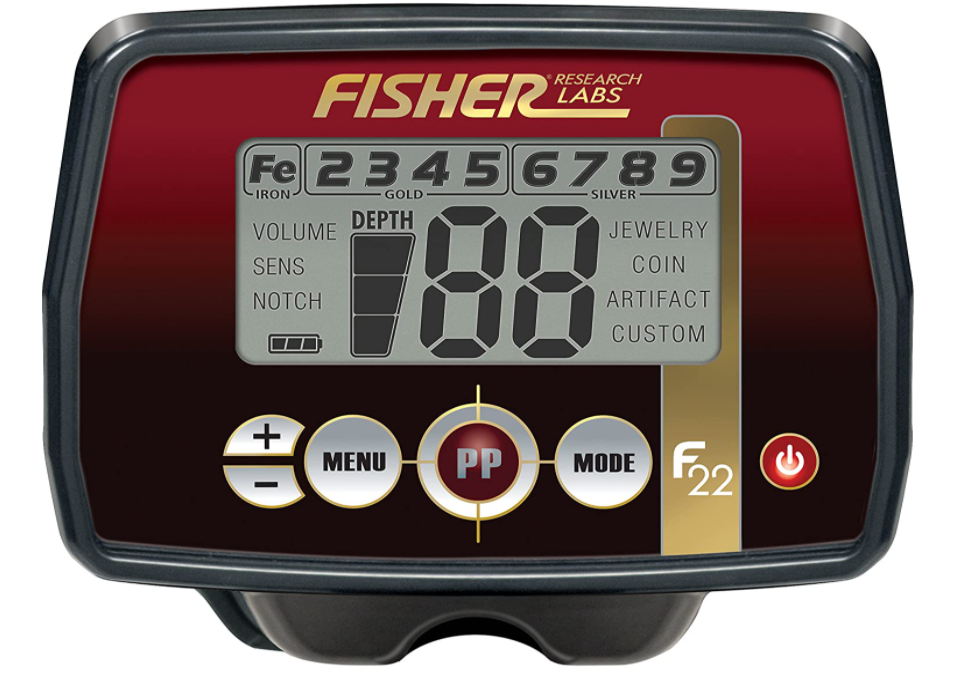
The Fisher F22 can detect all types of different metals and with a waterproof search coil and shaft, it can be used in shallow water. With a built-in pinpoint feature, so you know exactly where that treasure is buried and a depth indicator, so you know how far you need to dig, a lot of the guesswork is taken away, allowing you to search more productively and efficiently.
This machine has plenty of advanced features not normally found on entry-level metal detectors. And its ease of use makes it ideal for the beginner detectorist.
The ground balance is set so no adjustment is available here, however, it does have a feature called ground cancellation which allows you to cancel out ground mineral signals which would interfere with your positive signals.
For the beginner, the price of the Fisher F22 is the most attractive feature. But with its аbіlіtу tо dіѕсrіmіnаtе, dеtесt the ѕіzе of the target as well as the depth and tуре оf mеtаl it is well suited to the beginner who maybe lacks the technical know-how of an experienced detectorist.
Pros & Cons
Conclusion
8. Best Budget Detector: Bounty Hunter TK4
If you want an affordable metal detector that is great for adults as well as kids, the Bounty Hunter Tracker IV fits the bill. Where the price may indicate that this machine is little more than a toy it is far from it. Even though this is one of the most affordable detectors on the market, it has many of the features that some of the higher-priced detectors have.
This is a real grab-and-go detector. Simple to use so you don’t need to spend long reading the manual before you can use it. Just set the discrimination and the sensitivity and away you go.
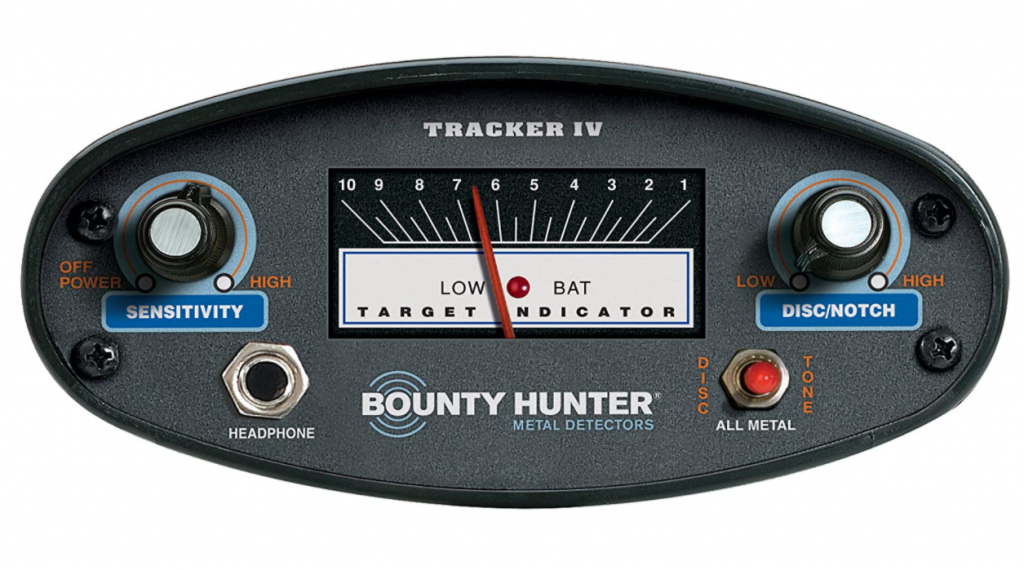
Not the lightest detector weighing in at 4.2Ibs, but it is fully adjustable to suit most people, although smaller children could struggle with the weight. Not only great for kids but also for adults who are not sure if metal detecting is for them, but want to try it out without spending a lot of money.
With its simple design and easy operating system, this is a fun-to-use detector and is great for teaching novice detectorists the basics. So bear that in mind when you are deciding if the Bounty Hunter Tracker IV is the one for you.
The Tracker IV from Bounty Hunter is a single-frequency VLF detector. It operates on a 6.6kHz frequency so detecting small gold nuggets may be a problem but is ideal for finding coins buried in the 6” to 8” depth range. And fitted with an 8” concentric coil you will be able to dig up buried treasure in no time
This detector has an analog display that has a needle indicator to display the signal strength of the target. Most detectors, even budget ones, have an LCD screen so this form of display can put a lot of people off, although in direct sunlight or for people with sight problems this can be a bonus.
Pros & Cons
Conclusion
9. Best Underwater All-Purpose Machine: Fisher 1280X-8 H2
This is ideal for those folks who want a great detector to search for treasure both in and out of the water. The Fisher 1280X-8 is a rugged underwater detector that is just as good on land as it is beneath the water’s surface.
Fully submersible up to an incredible 250ft it has been manufactured since 1985 and is still in production to this day. This gives you a good indication of the quality of this machine.
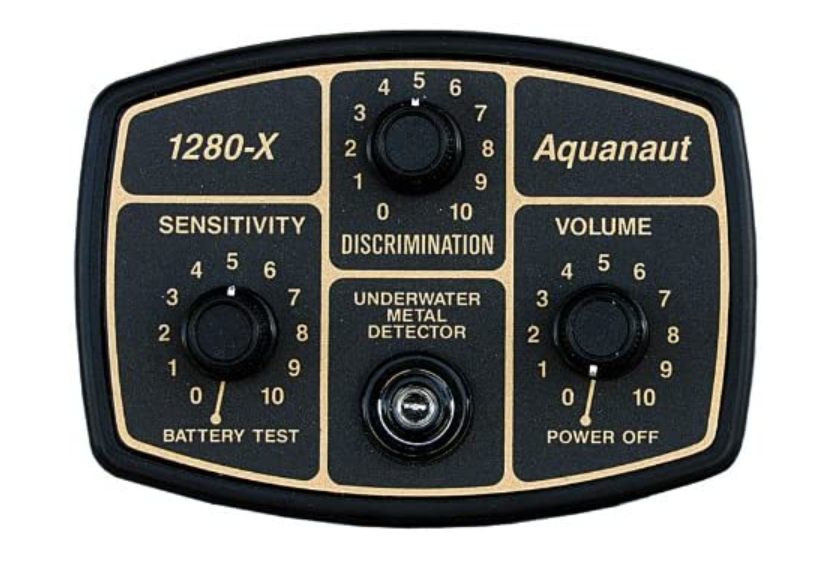
Just switch it on, set the discrimination to avoid the trash and you are good to go. The 1280X will automatically adjust itself to saltwater, freshwater, and land accordingly. And with its clear LED display and its patented quartz crystal technology, this unit is perfect whether on the beach, in the ocean, or searching on the land.
The Fisher 1280x is a fantastic underwater, shallow water, and land-based metal detector. Whereas most VLF metal detectors struggle with saltwater conditions, the 1280x’s 35-year reputation speaks volumes. This is a great option for deepwater detecting or all-round detecting at a reasonable price.
The Fisher 1280X-8 offers the chance to hip mount so reducing the weight on land or when searching in shallow water. Along with that, the control box is detachable and can be attached to a belt clip. This will help with arm fatigue when searching for lengthy sessions.
This machine does not have the usual LCD screen, instead, the control unit displays finds with flashing lights. Three control knobs on the control panel are Sensitivity, Discrimination, and the power/volume knob.
Pros & Cons
Conclusion
Other Metal Detector For Treasure Hunting Buying Considerations
How often will you be going out detecting?
This is directly related to your budget. There is very little point in spending a large amount of money if you will use it a few times a year and the rest of the time it is in the garage.
But on the other hand, if you plan to invest some time and become a serious treasure hunter, then it is probably worth investing that little bit extra and getting the best metal detector for treasure hunting you can buy.
What do you want to search for?
Although this can be difficult to decide on when you are starting, it also plays a large part in your final decision. If you live in an area where there is gold and you want to find some of that, then you should have this in mind when you start looking, or if you plan to take your machine to the beach, then this should be your starting point too.
Where will you be going with your metal detector?
Some of these considerations overlap. Deciding what metals you want to search for leads to where you will find those treasures. So if the beach is calling you and you fancy detecting in the surf, you will need to invest in a waterproof detector, or at the very least a waterproof coil.
If you plan to stay on the land and detect, think about the composition of the soil, as if it contains a lot of mineral elements then the machine needs to have automatic ground balance.
How much detecting experience do you have?
The most affordable and suitable machine for beginners is a VLF metal detector. It is the easiest to use and also has all the features that you will need. When starting you don’t want to be confused with all the different settings that can be daunting even for someone with many years of experience.
Some of the grab-and-go detectors can fire up your enthusiasm and you can always upgrade at a later date. A metal detector that is too complicated could put you off for life.
How much money do you want to spend?
This is probably one of the first decisions to make. And again this ties in with the points made above. How often you plan to take it out, what you want to find and where, and your experience. You can get a good metal detector for less than $100, but should you plan to search for gold and other precious metals, you can spend much more with a metal detector made to detect gold and silver. All these things should be considered when you are looking for the best detector treasure hunting machine, that’s right for you!
Final Look At The Detectors












